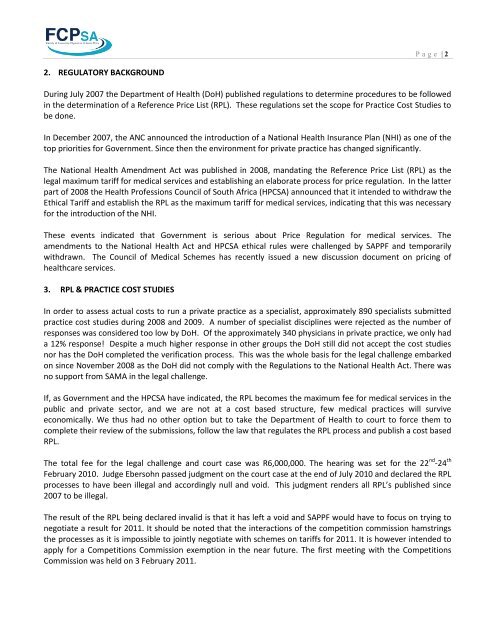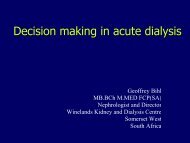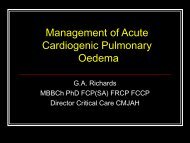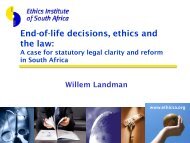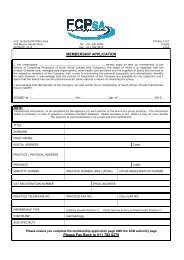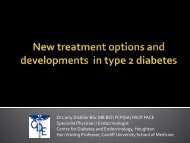to read more - FCPSA:. Faculty of Consulting Physicians of South ...
to read more - FCPSA:. Faculty of Consulting Physicians of South ...
to read more - FCPSA:. Faculty of Consulting Physicians of South ...
Create successful ePaper yourself
Turn your PDF publications into a flip-book with our unique Google optimized e-Paper software.
P a g e | 2<br />
2. REGULATORY BACKGROUND<br />
During July 2007 the Department <strong>of</strong> Health (DoH) published regulations <strong>to</strong> determine procedures <strong>to</strong> be followed<br />
in the determination <strong>of</strong> a Reference Price List (RPL). These regulations set the scope for Practice Cost Studies <strong>to</strong><br />
be done.<br />
In December 2007, the ANC announced the introduction <strong>of</strong> a National Health Insurance Plan (NHI) as one <strong>of</strong> the<br />
<strong>to</strong>p priorities for Government. Since then the environment for private practice has changed significantly.<br />
The National Health Amendment Act was published in 2008, mandating the Reference Price List (RPL) as the<br />
legal maximum tariff for medical services and establishing an elaborate process for price regulation. In the latter<br />
part <strong>of</strong> 2008 the Health Pr<strong>of</strong>essions Council <strong>of</strong> <strong>South</strong> Africa (HPCSA) announced that it intended <strong>to</strong> withdraw the<br />
Ethical Tariff and establish the RPL as the maximum tariff for medical services, indicating that this was necessary<br />
for the introduction <strong>of</strong> the NHI.<br />
These events indicated that Government is serious about Price Regulation for medical services. The<br />
amendments <strong>to</strong> the National Health Act and HPCSA ethical rules were challenged by SAPPF and temporarily<br />
withdrawn. The Council <strong>of</strong> Medical Schemes has recently issued a new discussion document on pricing <strong>of</strong><br />
healthcare services.<br />
3. RPL & PRACTICE COST STUDIES<br />
In order <strong>to</strong> assess actual costs <strong>to</strong> run a private practice as a specialist, approximately 890 specialists submitted<br />
practice cost studies during 2008 and 2009. A number <strong>of</strong> specialist disciplines were rejected as the number <strong>of</strong><br />
responses was considered <strong>to</strong>o low by DoH. Of the approximately 340 physicians in private practice, we only had<br />
a 12% response! Despite a much higher response in other groups the DoH still did not accept the cost studies<br />
nor has the DoH completed the verification process. This was the whole basis for the legal challenge embarked<br />
on since November 2008 as the DoH did not comply with the Regulations <strong>to</strong> the National Health Act. There was<br />
no support from SAMA in the legal challenge.<br />
If, as Government and the HPCSA have indicated, the RPL becomes the maximum fee for medical services in the<br />
public and private sec<strong>to</strong>r, and we are not at a cost based structure, few medical practices will survive<br />
economically. We thus had no other option but <strong>to</strong> take the Department <strong>of</strong> Health <strong>to</strong> court <strong>to</strong> force them <strong>to</strong><br />
complete their review <strong>of</strong> the submissions, follow the law that regulates the RPL process and publish a cost based<br />
RPL.<br />
The <strong>to</strong>tal fee for the legal challenge and court case was R6,000,000. The hearing was set for the 22 nd -24 th<br />
February 2010. Judge Ebersohn passed judgment on the court case at the end <strong>of</strong> July 2010 and declared the RPL<br />
processes <strong>to</strong> have been illegal and accordingly null and void. This judgment renders all RPL’s published since<br />
2007 <strong>to</strong> be illegal.<br />
The result <strong>of</strong> the RPL being declared invalid is that it has left a void and SAPPF would have <strong>to</strong> focus on trying <strong>to</strong><br />
negotiate a result for 2011. It should be noted that the interactions <strong>of</strong> the competition commission hamstrings<br />
the processes as it is impossible <strong>to</strong> jointly negotiate with schemes on tariffs for 2011. It is however intended <strong>to</strong><br />
apply for a Competitions Commission exemption in the near future. The first meeting with the Competitions<br />
Commission was held on 3 February 2011.


